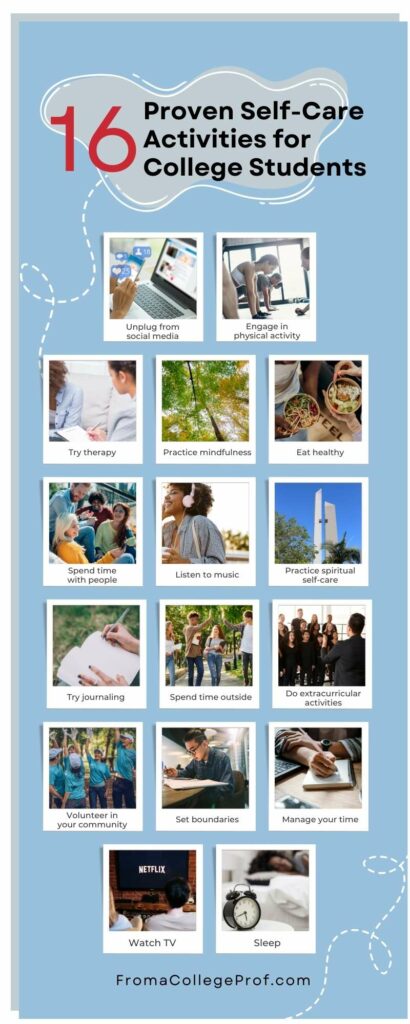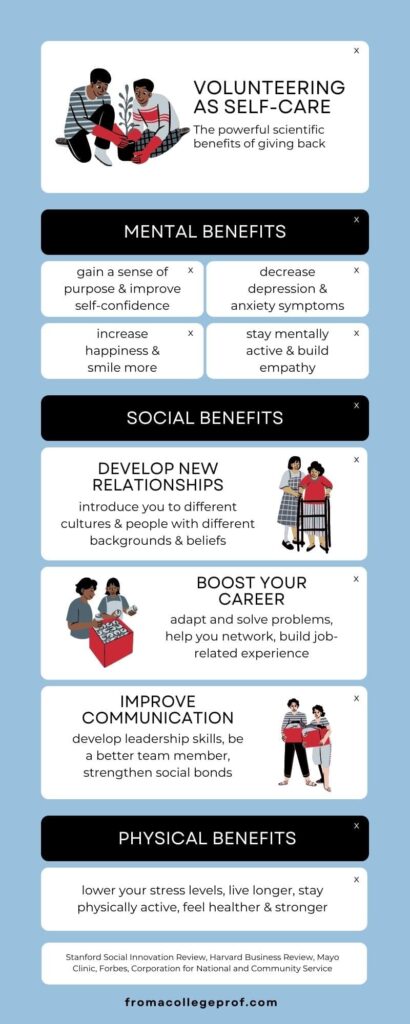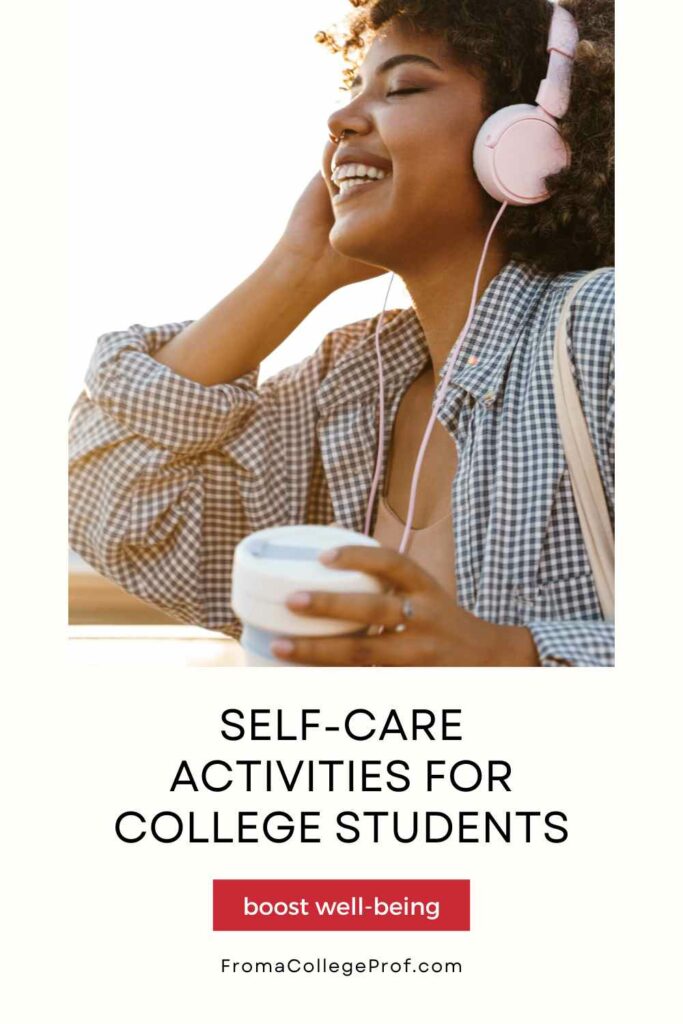Proven Self-Care Tips to Boost Well-Being in College Students

College students need to prioritize their well-being and develop healthy ways of coping with challenges and stress. We share the science behind the best self-care activities for college students and offer practical tips to make self-care part of your daily routine.
Some of the links below are affiliate links. At no additional cost to you, we earn a commission if you click through and make a purchase. We appreciate your support.
What is Self-Care and Why Does It Matter?
The University of Texas at Austin Counseling and Mental Health Center identifies self-care as the combination of activities and practices that help reduce stress and enhance overall well-being.
Yes, you read that right! Self-care is about the proactive steps we must take to take care of ourselves to succeed wherever we are in life.
Self-care isn’t a one-time thing. It’s a way of life that helps you deal with the daily stresses in your life. Everything from interpersonal relationships to academic pressure, financing your education, setting boundaries and more.
It’s important to know that self-care is not a one-size-fits-all but a one-size-fits-one. Your self-care needs may differ from those around you, and that’s ok! For instance, maybe you enjoy listening to the new Taylor Swift album in your face mask to relax while your friends enjoy hiking trails at local metro parks.
So how can you figure out what self-care ideas will be helpful for you on your collegiate journey? First, you have to identify some of your triggers or stressors.
What are Some of the Pressures College Students Face?
For many college students, the journey toward higher education can be a real challenge. Sometimes the stress is unique to this season of life, but other times it’s a continuation of lifelong struggles.
Some of the most common pressures are adjusting to a more independent life and making decisions on their own. Students are taking more challenging courses while trying to keep their grades up.
It’s stressful to try to provide income for yourself while maintaining good grades, studying and keeping a social life.
Zach Granger, Ashland University
They’re living with new people (often strangers) and struggling to make new friends. And then there’s adjusting to more downtime and less structure for eating and exercising.
My biggest stress is juggling work and a social life with academics.
Dakota Warner, Kent State University
One of the most significant barriers is financial constraints. Many students struggle to pay for tuition, textbooks and other academic necessities. This can be particularly difficult for low-income students.
My biggest challenge is having such a tight schedule to not be able to work and afford things! The biggest stress is the workload and expectations. When it gets the best of you, it can overtake your mind with stress and sadness.
Alyssa Takos, Marion Technical College
Another major challenge is the need for more support systems. First-generation college students often struggle with navigating the complexities of college life and may not have access to the support they need to succeed.
Additionally, mental health is a significant barrier for many college students. The pressure to perform well, the stress of balancing multiple responsibilities and the isolation that can come with being away from home can all contribute to mental health challenges.

The biggest stressor in college has been the amount of things that I have to do: academics, friends, organizations. And then there’s internship searches and the job search post college. There’s keeping yourself alive, keeping your room clean, making sure you’re doing everything you need to do so your mental health doesn’t go down the toilet.
It’s all happening at once and it feels like everything has the same priority level, so it’s hard to pick one over the other. I don’t know if that’s just college or if that’s going to be life forever, but it’s very stressful trying to manage all of that, all at once, all by yourself.
— Emma Friend, Ohio University
Finally, systemic barriers, such as discrimination and bias, can prevent students from accessing educational opportunities. Students from marginalized communities, such as LGBTQIA+ students, students of color, students with disabilities and others, may face additional obstacles in pursuing higher education.
Despite these challenges, many students persevere and find ways to overcome these barriers to achieve their academic and professional goals.
Did you identify with one of those issues? Or more? High stress levels are a reality, so it’s important to identify self-care methods that will help you manage the pressure and be successful.
16 Self-Care Activities & the Science Behind Them
We pulled together the best self-care tips from our own lives, current college students and recent grads. The important thing to remember is to find what works best for you. Try a few of these self-care practices and see how you feel!

A few recent graduates shared what helped them most when they were in college:

Going to the gym, spending time outside, bike rides, making new friends, clubs with people who have similar interests, maintaining hobbies, finding people to do familiar activities that you’d do if you were home, doing things that helped you relieve stress before college.
— Sofi Morel (University of Buenos Aires), Alexis Pochubay (Kent State), Cassidy Glider (Ohio State )
1. Unplug From Social Media

Did you know? In 2023, according to Businesswire, 73% of college students spend two or more hours daily on social media.
We bet you’re not one of those students who scrolls through TikTok or YouTube for hours at a time! We know you understand that taking five classes a week, getting involved on campus, working a job and studying don’t allow you the time to get lost on your phone for hours.
We get it. It happens to the best of us because we’re all human!
But instead of cutting off all social media cold turkey, start with a small step like unplugging from social media for one day.
Unplugging from social media is the intentional act of withdrawing from social media platforms for a set time. That can include your favorite apps like TikTok, Snapchat, Instagram, YouTube, Pinterest, Lemon8, Facebook or Twitter.
Taking a break from social media has numerous mental and physical benefits. Unplugging from the constant barrage of notifications and updates can allow you to focus on real-life interactions and activities.
College students underwent a social media detox in a 2021 study and reported that it reduced anxiety, improved sleep quality, increased productivity and improved mood.
Want those benefits but need some accountability?
- Partner with some friends and unplug as a group for short periods of time
- Make a no phones policy while grabbing lunch or dinner with friends
- Try using screen time apps like OffScreen, Opal or ScreenZen, which help you minimize your digital screen time by blocking app usage
- Check out the free tools built into the phone that you can utilize, such as digital well-being (Android) and iOS screen time (iPhone)
2. Engage In Physical Activity

The benefits of physical activity are endless! Mayo Clinic highlights how regular exercise can help to improve your overall physical health, strengthen your body, increase your self-confidence, and even boost your mood.
Physical activity can help you feel good by boosting your body’s production of the brain’s feel-good neurotransmitters, called endorphins. When endorphins are released, they help you relax and minimize mild symptoms of stress and anxiety.
Don’t know where to start? Check out your on-campus recreation center to determine what movement works for YOUR body and needs.
You may decide that doing aqua Zumba with your floor mates or taking a yoga class at the local community center works better for you instead of running.
If group activities aren’t your thing, try making small individual changes to incorporate more physical activity into your life. For example, you could take the stairs instead of the elevator or try doing light stretching or try using some yoga cards while watching TV.
3. Try Therapy

Seeking therapy can be a proactive step towards better self-care management so you can show up as your best self.
As we mentioned earlier, college students often face a lot of stress and pressure from academic demands, social life and transitioning to a new environment.
Therapy can provide a safe, non-judgmental space to work through these challenges and learn coping skills.
It can also help address mental health issues. Psych Central reports that symptoms of depression and anxiety are common among college students, and therapy can help.
“It’s incredibly liberating to spend an hour talking to someone and not caring about what you sound like. It’s about understanding myself. Sometimes I’ll speak to my therapist for an hour a day. It’s become part of my routine.” – Shakira, Singer
Therapy is becoming more accessible to more people through video, phone, apps and even text messaging, allowing your therapist to meet you where you are.
Checking out therapy for the first time? We know it can feel like a huge step. Remember, you’re not alone!
Steps to Starting Therapy:
- Look up your institution’s mental health services website and give it a scan for the services they offer. A quick Google search should bring it up, but if you’re unsure, reach out to a trusted source on campus, like your professor or resident advisor.
- Write down the things that interest you or any questions regarding the next steps. Most campuses will allow you to schedule a confidential introductory call online or by phone to discuss any questions.
- Book the call, and remember that asking for help is a huge accomplishment!
- Celebrate yourself for taking that first step in advocating for your well-being!
4. Practice Mindfulness

Practicing mindfulness is a wonderful way to take care of yourself. It’s a method of self-awareness that helps to reduce stress and anxiety, regulate emotions and improve focus.
Mindfulness allows us to be present in the moment and to appreciate the world around us. It can help us to be more in tune with our thoughts and feelings and to accept them without judgment.
The American Psychological Association says that incorporating mindfulness into our daily lives helps us experience greater peace and happiness. We could all use more of that.
Not sure how to practice mindfulness? Try these steps:
- Start by finding a quiet and comfortable place to sit. This can be a quiet space in your residence hall or your favorite outdoor hideout on campus.
- Close your eyes and take a few deep breaths to help you relax. Then, focus your attention on your breath. Notice the sensations of the air moving in and out of your body. If your mind wanders, gently bring your attention back to your breath.
- The key is to stay present and not get lost in thoughts about the past or worries about the future. With practice, mindfulness can help you feel more calm and centered in your daily life.
The Headspace app is another way to practice mindfulness. It’s a favorite for many college students! Check out the free trial and see what you think.
5. Eat Healthy

A significant element of self-care is maintaining a nutritious and balanced diet. Consuming healthy foods provides the necessary fuel for your body and contributes to your overall health.
But…we know firsthand the joys of ordering takeout and binging on potato chips and ice cream with our suitemates. We encourage you to indulge in those moments!
But we also want you to remember to prioritize your overall well-being during your college years. The habits you develop now don’t automatically change when you graduate. They stay with you into adulthood.
It can be easy for college students to fall prey to unhealthy eating habits due to a lack of time or money. However, with a bit of planning and effort, a healthy diet full of delicious food on a budget is doable.
Small steps for healthy eating:
- Grab a smoothie instead of a soft drink
- Sit down for a meal instead of eating snacks on the go (bonus if you do this with some friends and without your phone!)
- Eat a variety of fruits and vegetables so you don’t get bored (seasonal produce is cheaper)
- Stock up on these 45+ healthy dorm-friendly foods
- Prep meals and snacks ahead of time if you live in an apartment
- Set a limit on the number of fast food trips each week (and stick to it)
6. Spend Time with People

Making time for social interactions can be a valuable way to care for yourself. Socializing can help us feel more connected, supported and understood.
We can’t ignore the impact of the Covid-19 pandemic on everyone’s social lives, but it’s been especially hard on teens and young adults. The pandemic interrupted patterns and changed how students engage socially at in-person events, which can be exhausting.
Attending college during the history-altering pandemic was most definitely a challenge to the traditional learning I had become accustomed to. A lot of my professors were not only accommodating to the sudden change, but they also recognized that we all went through the change together, both professors and students. It helped put things in perspective.
Michael Caruso, The Ohio State University
But a 2022 study found that meaningful social interactions (virtual and in-person) are key to helping students navigate life’s challenges. According to the National Library of Medicine, spending time with other people can help reduce loneliness and social anxiety.
In addition to improving our mood and reducing stress, social connections can benefit our mental and physical health by improving cognitive function, building resilience, and expanding our community networks.
If you’re looking for a simple yet effective way to take care of yourself, try prioritizing social connections and interactions. Be intentional about spending time with loved ones and connecting with new people.
Easy ways to be more social:
- Call or FaceTime a friend or family member
- Go for a walk or run with a roommate
- Join a study group
- Attend an event on campus
- Join a club or organization
7. Listen to Music

What is your favorite song? You know, the one you keep listening to on repeat.
Well, did you know that listening to your favorite song is an act of self-care? According to Psychology Today, listening to music can reduce stress and anxiety, enhance creativity and improve memory and learning.
Even better for college students…it’s affordable!
It’s not surprising that music is used as a therapeutic tool in various settings, cultures and communities around the world.
So, if you feel overwhelmed or need a little boost, try listening to your favorite tunes and see how much better you feel.
If you want to spruce up a study session, try playing music while working with your friends.
We love listening to music from Brain.fm, science-backed functional music supported by the National Science Foundation.
8. Practice Spiritual Self-Care

Spiritual self-care is an essential aspect of overall wellness. Taking the time to connect with a higher power can bring peace and clarity to your college journey.
According to Verywell Mind, spiritual self-care involves anything that helps you develop a deeper sense of meaning and understanding.
Some ways to practice spiritual self-care include meditation, prayer, journaling, or attending religious services aligned with your beliefs. It’s essential to find what works for you and make it a regular part of your routine.
By nurturing your spiritual self, you can cultivate a more profound sense of purpose and meaning in life.
9. Try Journaling

Journaling is a simple yet powerful tool that can help you take better care of yourself. And it doesn’t require much time. Or money!
Even a few minutes each day can make a difference! Writing down what you’re thinking or how you’re feeling can help you gain clarity, reduce stress, and improve your overall well-being.
Those benefits are backed by research. Melanie Hall Morris, a nursing professor at Vanderbilt University, says, “I truly believe in the science that says reflective writing can lead to physical and emotional healing.”
By reflecting on your day, you can identify patterns and habits that may hold you back and develop strategies for overcoming them. You can also learn to be more gentle and kind to yourself. When you treat yourself with compassion, you’re more likely to treat others that way!
So why not try it out by writing just a few of your thoughts today? You might be surprised at the benefits you experience.
If you want a guided journal to help you get started, try one of these:
- Becoming: A Guided Journal for Discovering Your Voice
- My Wellness Journal
- The 5-Minute Gratitude Journal
10. Spend Time Outside

Get outside and enjoy some fresh air! Spending time outdoors is an excellent method of practicing self-care.
According to the American Psychological Association, being in nature has several benefits for our mental and physical well-being. It can help decrease stress and anxiety levels, lower blood pressure, improve attention, and enhance overall mood.
Moreover, spending time outside enables us to disconnect from our phones and the unending demands of college life. That alone is good for our overall health.
Easy ways to get outside more often:
- Walk to class instead of driving or taking the bus
- Eat lunch with friends in a park or campus green space
- Take a few minutes to just sit outside and breathe the fresh air
- Study or read outside instead of in the library
- Get up early once a week to watch the sunrise
Taking the time to be in nature is an extraordinary approach to prioritizing self-care.
11. Get Involved in Extracurricular Activities

For college students, maintaining self-care and finding the best way to de-stress from academic demands is crucial. Extracurricular activities are an excellent way to achieve this goal.
Not only do these self-care activities for college students provide a break from studies, but they also enable you to develop and pursue your interests and passions outside of the classroom. It’s also a great way to meet new people outside of your major.
According to a study at Ohio State, campus involvement can help with academic success, cognitive development, well-being, leadership and multicultural awareness.
Joining a competitive or club sports team, a fraternity or sorority or a volunteer organization can be a form of self-care that keeps you balanced and fulfilled. If you’re not sure what student organizations are offered at your school, look for information on the university’s student life website.
A quick word of caution: It can be really tempting to join every club you see. We recommend exploring the options first and then joining the ones that work best for you.
12. Volunteer In Your Community

Volunteering can be a gratifying and therapeutic way to take care of ourselves. When we give back to our community or a cause we care about, we help others and boost our well-being.
By focusing on the needs of others, we can gain a new perspective on our problems and gain a sense of purpose.
Volunteering can also provide opportunities for social interaction and networking, which can be especially beneficial for those who may feel isolated or disconnected, says the New York Times.
There are many different ways to get involved in volunteering, from donating time at a local charity or non-profit organization to participating in community events or fundraisers. Need a good idea? Check out this list of 117 ways to give back.
Whatever the activity, the best thing about giving back? It’s a powerful form of self-care that benefits both ourselves and our community. It’s a win-win!

13. Set Boundaries

During your college journey, you will learn quickly that you have to manage many competing priorities in your life. Learning to set and communicate boundaries as a form of self-care is essential for our mental and emotional well-being.
Your friends want you to attend an event at the same time as your class office hours. You have to make a choice. Will you hang out with your friends or get the help necessary to finish your assignment? That is an example of setting a boundary.
It can sometimes be challenging to prioritize our needs and say no, but it’s crucial.
Need help setting boundaries? Check out this great article from Positive Psychology on how to effectively set boundaries.
14. Manage Your Time

Time management may seem counterintuitive as a self-care strategy, but it’s a necessary skill that has endless benefits. A 2021 study found that managing our time well impacts our well-being.
What’s helped me the most is figuring out what has the highest priority at the moment. That, and talking through stuff and making lists.
Emma Friend, Ohio University
Learning how to effectively manage your time will help you balance priorities and set those boundaries we talked about. You’ll be more productive and you won’t miss important deadlines. Which means a lot less stress and anxiety!

Throughout my college career I learned time management skills that helped me plan things ahead of time. My recommendation is to start early on coursework and break it down to small, manageable pieces. You will have less stress and more time to ask questions about the work.
— Mero Yasser, Ohio State
Time management as a self-care activity wasn’t on our original list, but when several college students told us how important it was to them, we knew we had to add it.
Need some help managing your time? A planner is a great place to start. Here are our favorites:
- Franklin Planner – This is the BEST planner and planning system for figuring out how to prioritize everything in your life. It’s a favorite among professionals, so it’s a great system to carry into your career after college.
- The Centered Student Planner – Designed by a teaching professor (okay, we already love it), this planner is all about time management strategies to increase academic success and prioritize self care.
- Digital Student Planner from Dash Planner – Use this planner on an iPad or tablet in either portrait or landscape mode. It comes with a lot of extras: meal planning, budgeting, setting goals, keeping master lists and more.
15. Watch TV

Yes, taking a moment after class to watch an episode of The Office can be an act of self-care. There are many benefits to watching TV as self-care.
For one, it can be a way to escape everyday life’s stresses. When watching your favorite tv show, you’re not thinking about schoolwork or other adult responsibilities.
Additionally, watching TV can be a great way to learn about new things. Whether it’s a documentary or a fictional show set in a different time period, TV can be a source of education and insight.
Of course, it’s important to remember to balance screen time with other activities, like exercise and socializing. But when done in moderation, watching TV can be a great way to take a moment for yourself.
16. Sleep

As a busy student, you can be tempted to spend hours cramming for an exam and neglect an important act of self-care: sleep.
However, research highlighted by the US Department of Health & Human Services shows that when students have a full night’s rest, they are more likely to have improved concentration and higher cognitive function.
So to pass that test, you must set aside enough time for rest!
Getting enough sleep can also include taking a nap throughout your busy day to rejuvenate. It’s an ideal way to give your brain a break and recharge your batteries.
Research from the Centre for Cognitive Neuroscience found that after a one-hour afternoon nap, students had better long-term memory than if they spent that hour cramming. Even a short nap of 6-10 minutes can help you feel more alert.
Remember, getting enough rest is crucial for our physical and mental well-being, so prioritize sleep as part of your daily routine.

It’s been 8 years since I began my collegiate journey – I have yet to receive my bachelor’s degree. The biggest barrier I have faced has been myself. There were times I didn’t believe in myself, didn’t care enough to wake up for class, didn’t care enough about my body…giving me an almost endless cycle of funk.
Had I only learned that putting myself – my health and well-being – ahead of everything else, how different my life would be. I am beyond happy with how my life has played out, I just wish that I loved myself a lot sooner.
— Katelyn Craft, University of Akron
Remember, taking care of ourselves enables us to show up for others in a more healthy way.


Shaniqua Ingol
A former higher education professional, Shaniqua (she/her) is currently a DE&I Marketing Manager and a proud alumnus of The Ohio State University. She enjoys reading nonfiction books, creating social media content and empowering young voices to go against the status quo and blaze new paths.
“As a first-generation student, attending college changed my life! I advise incoming students to embrace those uncomfortable moments; they are your best teachers.”






